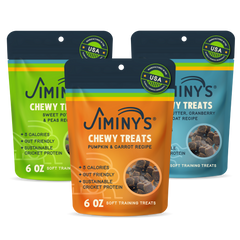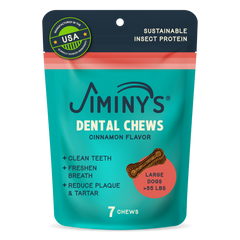We all love our dogs - and part of loving them is the responsibility of caring for them. Part of this, of course, is cleaning up after them. And as you likely already know, dogs sure do generate a lot of waste. A healthy dog will poop at least once a day, but sometimes they can go No. 2 up to three times per day. This can leave quite a mess around the yard, and while it's quite an unflattering chore to clean up after your pup, we encourage you to also put some thought into how to safely and sustainably discard your dog's waste.
With more and more consumers becoming increasingly invested in environmentally-friendly best practices, we thought we'd take a closer look at the most sustainable ways to get rid of your dog's waste. First, it's worth discussing why dog poop is different from human waste.
What Makes Dog Poop Different?
Dog waste is unlike human waste in that it contains various different types of microorganisms that can be very harmful. If discarded irresponsibly, dog poop can contaminate soil, water and more. If left in the yard for too long, any pathogens in the feces could be transmitted to humans. Furthermore, it's estimated that a whooping 40 percent of pet owners don't take dog waste removal seriously - which can have dire consequences for the environment and potentially even for the health of themselves and their family. The good news is that there are a few eco-friendly pet waste best practices.
Eco-Friendly Ways to Dispose of Dog Poop
Compost it
Dog poop isn't like other types of waste or food scraps, so it's likely going to ruin your compost pile if you just toss it in there as is. The good news is that you can purchase a pet waste compost bin to help with this. These help break down dog waste in a safe and sustainable manner. However, you'll need to ensure that this compost bin is buried in your yard far away from gardens or natural water sources to avoid any type of cross contamination. For this reason, they may not be suitable for all pet owners. But if you meet the criteria, composting dog waste in a purpose-built bin is both easy and effective.

Work with a Collection Service
While working with a dog waste collection service often comes at an additional fee, these services will usually take that extra step of bringing the waste to an appropriate treatment facility, where it can be properly processed. Some collection services will likely even scoop up dog waste in the yard for you, making it a true win-win.

Scoop it
Contrary to what you may believe, one of the most sustainable ways to get rid of dog poop is simply to scoop it quickly and toss it out with your weekly garbage. Letting dog poop sit in your yard and letting rain wash it away isn't environmentally-friendly, as the pathogens from dog waste can enter storm drains and enter area lakes, streams and rivers - harming marine wildlife.

The bottom line is that simply scooping it, bagging it and tossing it out with the weekly trash is an eco-friendly way to get rid of dog waste compared to some alternatives. For bonus sustainability points, we suggest using a biodegradable bag (more on that later).
How Not to Dispose of Your Dog's Waste
Now that we've talked about a few ways to dispose of your dog's waste in an environmentally responsible manner, we figured it'd be worth it to share a few things that you absolutely don't want to do after picking up after your pup:
Don't Flush it
First of all, just the thought of picking up a dog's droppings, bringing it back into the home, dropping it in the toilet and then flushing it sounds exhausting. But there are a few other key reasons why you shouldn't flush your dog's waste down the toilet.
Like we said earlier, dog poop contains pathogens that you don't find in human waste, so it can be more difficult for wastewater treatment systems to properly process it. And two, extra toilet flushes use more water - and part of a sustainable lifestyle is trying to conserve as much water as possible.
Don't Trust All Biodegradable Dog Waste Bags
"Biodegradable" is a big sustainability buzzword, but it might not always be as advertised. In other words, not all biodegradable dog bags are created equal - and consumers were warned about this a few years ago when the Federal Trade Commission warned about mislabeled pet waste bags making the rounds.
Biodegradable is suppose to qualify as "the product will completely break down into its natural components within one year after customary disposal." Most waste bags, however, end up in landfills where no plastic biodegrades in anywhere close to one year, if it biodegrades at all.
Dog waste bags is a viable option for your doggie cleanup needs, but make sure that the bag you're using is, indeed, biodegradable as advertised. Typically, bags made from corn are your best option.





